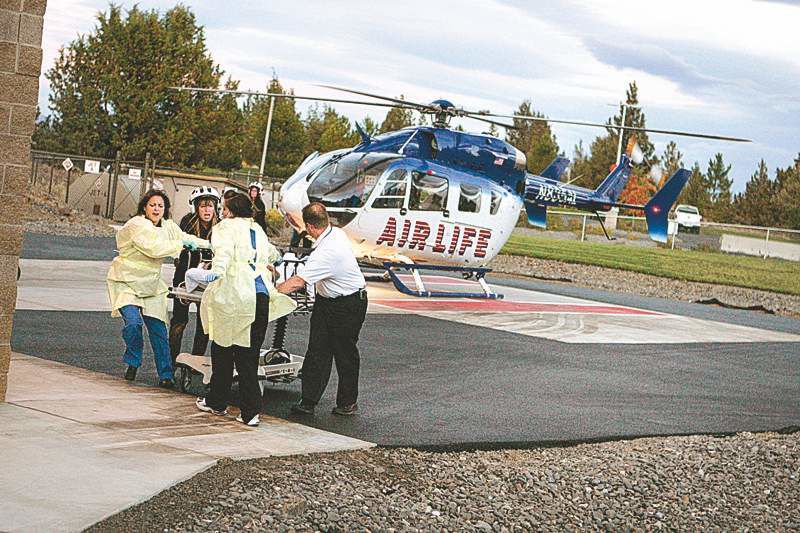Hospitals consider changes to AirLink
Published 5:00 am Wednesday, October 29, 2008

- Members of the AirLink crew and St. Charles Bend employees wheel a patient into the emergency room last year.
Just three months after announcing a new name and logo for their air ambulance service, Cascade Healthcare Community officials say they are considering changing the way it operates.
AirLink Critical Care Transport service could be expanded, sold or form a partnership with another organization. That last option is the most likely right now, according to an announcement of the changes on the hospital’s intranet.
No decisions have been made, and specifics about the future of AirLink are still unclear. Strategic considerations, including the current economic climate and fears of competition, are driving the changes, said Tim Bricker, a CHC executive vice president.
According to the intranet announcement, executives are evaluating the “long-term direction” of AirLink and looking into ways to “improve the stability of air medical transport services in the region.”
The CHC board, which will have to approve any changes, is set to take up the issue at its November board meeting, Bricker said.
It’s likely, though not guaranteed, that Central Oregon will continue to have local air medical transport. Currently, the hospital owns three fixed-wing planes and one helicopter, and maintains bases in Bend and La Grande. The hospital would like to keep those bases, Bricker said, although he could not say for sure it would.
“There could be a scenario in which we wouldn’t,” he said.
Up in the air
The effect on the hospital’s staff is also unknown. In addition to a number of medical technicians, about a dozen nurses work with AirLink, Oregon Nurse’s Association representative Alison Hamway said. Those nurses, she said, learned of the potential changes in a meeting with Bricker last week.
The number of staff ultimately retained, CHC spokeswoman Janette Sherman said, “will depend on who and when and how we strike a partnership. The goal is to retain as many employees as we can.”
The pilots and mechanics work through Metro Aviation, which manages the planes. Metro did not return calls for comment.
AirLink members, who pay an annual fee to be transported without cost if needed, are unlikely to be affected, Bricker said. CHC, which owns St. Charles in Bend and Redmond, is working to make sure their service and membership benefits continue uninterrupted.
Safety concerns have brought the aircraft under increased scrutiny in recent months.
In July, just days before the announcement of the new name, staff concerns about the safety of the aircraft prompted a temporary shutdown of the entire fleet for several days.
Those concerns also triggered an investigation by the Federal Aviation Administration into the safety of the hospital’s fleet. Neither Metro nor CHC has heard the results of that investigation, Bricker said.
The decision to change the structure of AirLink is being driven both by industry trends and the economic climate.
What has changed?
The medical transport industry, Bricker said, is consolidating from hospital-based programs, such as CHC’s, to community-based programs, which are often owned by more than one entity, such as a group of hospitals. A consortium, Bricker said, may be advantageous because it is set up specifically to provide air transport, it often serves several hospitals, and it can take better advantage of economies of scale.
CHC might be looking at partnering with one particular community-based air medical transport program, Life Flight, which is based and owned by a group of hospitals in Portland. Bricker called Life Flight “a great example of a community-based program.”
Sherman said the hospital has focused some of its efforts on that group. “We are having more in-depth discussions with Life Flight than other groups, but nothing has been decided yet.”
Changes in AirLink are also being driven by the economic climate, particularly the events of the past six weeks, Bricker said. The credit crisis that has dried up funds at investment banks has also hit the hospital.
“We’re seeing that our access to capital is increasingly difficult because of access to credit,” Bricker said. “That requires us to look more carefully at capital expenses.”
AirLink is an expensive service, Bricker said, with significant money sunk into owning and maintaining the aircraft. Those costs remain high, even when the number of patients drops. Looking toward the future, he said, the hospital may decide to forgo those expenditures to concentrate on services more closely related to providing acute care.
“Our true core business is acute care, not air transport. We’ve done it for a long time, and we’re very good at it, but in the end, it’s not CHC’s core business.”
What’s next?
At its November meeting, the board of Cascade Healthcare Community will discuss changes to its AirLink Critical Care Transport service. Options being considered are expanding the service, selling it or forming a partnership with another group. AirLink members are unlikely to be affected by any changes, according to CHC; it’s unclear how hospital staff would be affected.






